Share
Working at ESO
Are you interested in working in areas of frontline technology and in a stimulating international environment? Do you feel your profile matches our requirements? Learn more about our current vacancies and apply online. Read more..
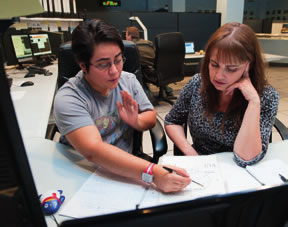
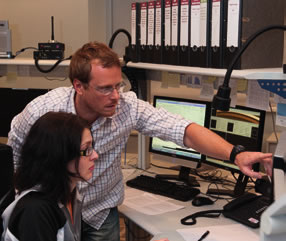

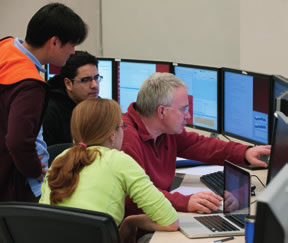
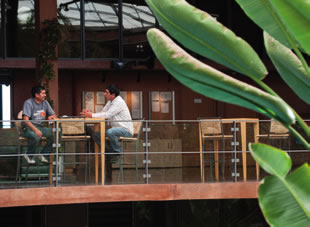
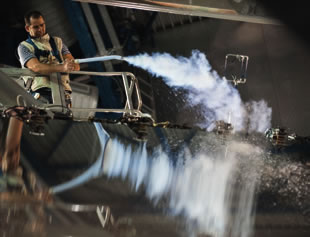
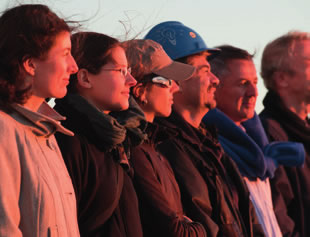
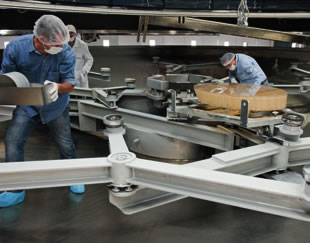
The European Organisation for Astronomical Research in the Southern Hemisphere (ESO) is the foremost intergovernmental astronomy organisation in Europe and the world's most productive ground-based astronomical observatory. ESO carries out an ambitious programme focused on the design, construction and operation of powerful ground-based observing facilities enabling astronomers to make important scientific discoveries.
ESO operates three unique world-class observing sites in northern Chile: La Silla, Paranal and Chajnantor (home to ALMA and APEX), and the ESO Headquarters are located in Garching, near Munich, Germany.
At Paranal, ESO operates the Very Large Telescope, the world's most advanced visible-light astronomical observatory, and will host and operate the southern array of the Cherenkov Telescope Array, the world's largest and most sensitive high energy gamma-ray observatory. ESO is a major partner in ALMA, the largest astronomical project in existence. And on Cerro Armazones, ESO is building the 39-metre Extremely Large Telescope (ELT), which will become "the world's biggest eye on the sky" and whose operations will be fully integrated into the Paranal Observatory.
For its Maintenance, Support and Engineering Department, within the Directorate of the La Silla Paranal Observatory, ESO is opening a Local Staff Member position as
System Engineer
Paranal
Deadline 30/04/2019
The Maintenance, Support and Engineering (MSE) Department of the Paranal Observatory ensures technical availability of the four VLT 8m telescopes, the two survey telescopes (VST and VISTA), the VLT interferometer with its auxiliary telescopes, many complex instruments for scientific observations and common facilities (power production, chillers and three coating units). The MSE Department of Paranal has a total workforce of about 60 engineers and 25 technicians, distributed in six groups (Systems and Optics, Electronics, Mechanics, Software, Instrumentation, and Support and Quality Assurance). The System and Optics Group (SAO), within MSE:
- Is responsible for system analysis, performance assessment and optical elements engineering/maintenance for all VLT telescopes and for the VLTI infrastructure.
- Supports Instrumentation group for coating and optical engineering/maintenance, and all technical groups for system analysis and performance assessment.
Main Duties and Responsibilities:
- Addresses system level issues adopting a hands-on approach, flanking the discipline experts.
- Interacts with all stakeholders (scientists, operators) to define functional and performance indicators.
- Monitors system level functions and performances.
- Performs and publishes system faults analysis as required.
- Supports the change management process by coordinating and/or supporting system modifications
- Supports internal and external projects by managing interfaces, participating to reviews and commissioning as required.
- Proposes and develops improvements at prototype or operational level.
- Supports the development of data analysis and the pursuance of high engineering standards across the department.
As a member of the system engineering team, and within her/his scope of responsibility, she/he: As responsible of subsystem(s) and with the support of the System Operational Team, she/he ensures availability of the system according to specification and coordinates:
- The preventive maintenance actions;
- The troubleshooting in case of failure or misbehavior and the relevant corrective maintenance;
- The development and upgrade of the maintenance plans;
- The management of spares and obsolescence issues.
Reports to:
The Head of the System and Optics Group.
Key Competences and Experience:
The position requires:
- Hands-on experience with complex engineering systems, preferably optomechanical assemblies or other scientific instrumentation.
- Versatility to work in a multidisciplinary context, ideally with experience in coordinating a multidisciplinary team of experts, as a minimum the willingness to develop the relevant skills.
- Good knowledge of data analysis and statistical techniques.
- Good level of autonomy and self-organization.
- Good time management and interpersonal communications skills.
- Proficiency in the use of common analysis tools like Matlab, Python.
- Experience in any of the following is desirable:
a) Operational scientific environments;
b) Database structure and tools like KairosDB and Elasticsearch;
c) Anomaly detection, machine learning and AI;
d) Industry 4.0 standards and connected devices.
The position is open to candidates with limited working experience, provided they demonstrate the capability to grow in the position. More experienced candidates are welcome to apply too.
Qualifications:
A university degree in an Engineering discipline or Applied Physics is required (5-6 years degree). Formal training in systems engineering is not a requirement.
Language Skills:
The position requires fluency in English.
Remuneration and Contract:
We offer an attractive remuneration package including a competitive salary, educational and other social benefits, as well as financial help in relocating your family (if needed).
For any further information, please visit https://www.eso.org/public/archives/static/jobs/conditions/brochure-lsm-nov2015.pdf
The initial contract is for a period of two years with the possibility of an indefinite extension, subject to evaluation. The title or grade may be subject to change according to qualification and the number of years of experience.
Duty Station:
Paranal Observatory located 120 km south of the city of Antofagasta, Chile. The working schedule will be 8 days on duty and 6 days off duty (8x6) with accommodation provided on site. Place of residence shall be either Santiago or Antofagasta.
Career Path:
V
Application:
If you are interested in working in areas of frontline science and technology and in a stimulating international environment, please visit http://www.eso.org for further details. Applicants are invited to apply online at https://recruitment.eso.org/. Applications must be completed in English and should include a motivation letter and CV.
Deadline for applications is 15 April 2019
Interviews are expected to start soon after this date.
No nationality is excluded, however non-Chilean applicants must have the pertinent working permit, according to Chilean regulations, at the time of the application. The post is equally open to suitably qualified candidates irrespective of gender, age, disability, sexual orientation, race or religion.
